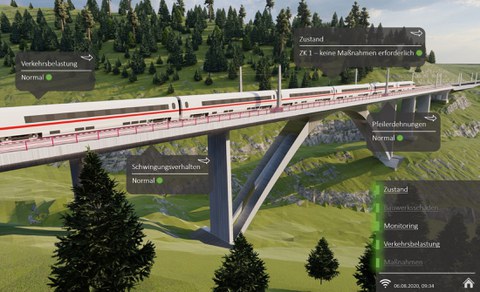Apr 01, 2021
Extend the lifespan of structures with 100+

Digital twin of the Grubental Bridge
The civil engineers of the TU Dresden have successfully initiated a new priority program (SPP) of the German Research Foundation DFG. The project "Hundred plus - extending the lifespan of complex building structures through intelligent digitization" is one of a total of 13 priority programs - and one of two new SPPs at the TU Dresden - that has now been awarded the contract by the Senate of the DFG in a virtual meeting. The funding of 2.4 million euros per year is initially for three years, with a second funding phase being sought.
The idea was provided by Prof. Steffen Marx, former professor for solid construction at Leibniz University Hannover and for one year owner of the "DB Netz AG - Endowed Professorship for Civil Engineering" at the Institute for Solid Construction at TU Dresden. Steffen Marx is a bridge builder with body and soul. In research and practice, he has been involved in modern new bridge construction for many years, but also with building in existing structures, concepts for building monitoring, monitoring building reactions and the non-destructive recording and assessment of the damage.
The approach of the SPP is the fact that the condition of a building - similar to that of humans - is characterized by an ever-faster rate of degradation with advancing age. Early, preventive measures against aging are a basic requirement in order to extend the usability of complex structures. The goal must be predictive maintenance. This requires fundamental research on the methods of recording, linking and evaluating a wide variety of data, e.g. on geometry, material, stress and aging. Digitization, especially the concept of the digital twin, is taking on a completely new meaning in this context. It enables the combination and real-time evaluation of all data required for operation and maintenance and its implementation in status and forecast models.
Basic research is planned in three interdisciplinary research areas. In the area of "digital models", methods are to be developed to generate largely automated georeferenced, object-oriented 3D models from heterogeneous existing data that contain both geometry and semantic information. The topic of the "Digital Link" area is how the time-variant status information of the real object can be processed using innovative real-time monitoring concepts and linked to the digital twin. In order to automatically convert huge amounts of data of different structures and origins into status information that the engineer can quickly and largely intuitively grasp, scientific method development for “status indicators” is planned, which are to be developed on the basis of physical and mathematical models and with the help of artificial intelligence.
The tender for the SPP “Hundert plus” is currently being worked on, which is targeted for the summer of 2021.
information for journalists:
Prof. Steffen Marx
Tel.: 0351 463-35856
Web https://tu-dresden.de/bu/bauingenieurwesen/imb/das-institut/beschaeftigte/smarx
